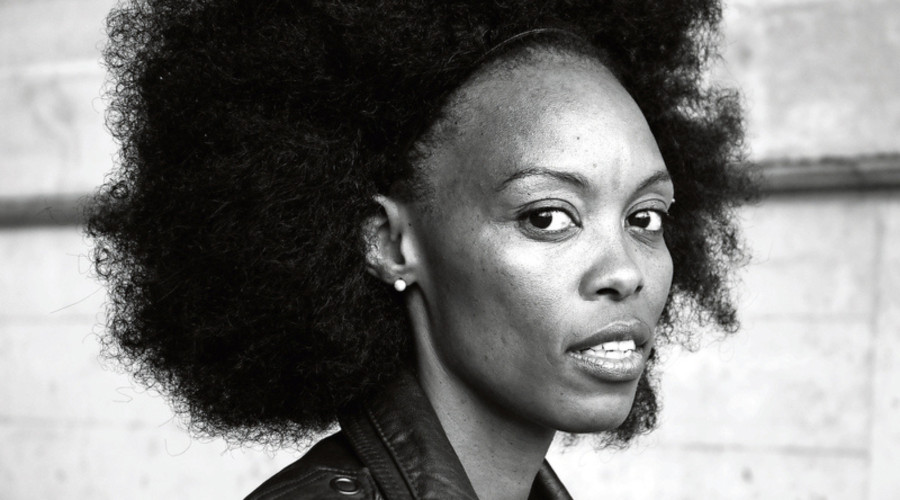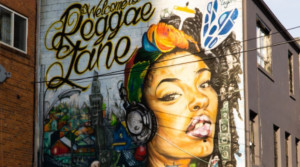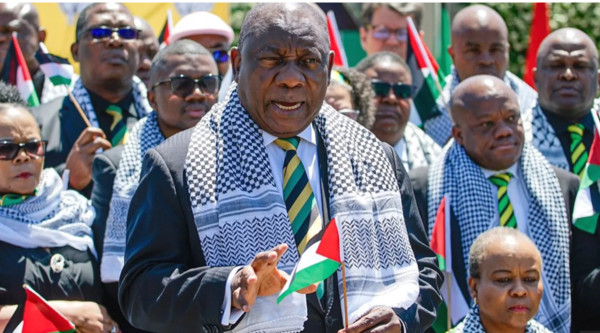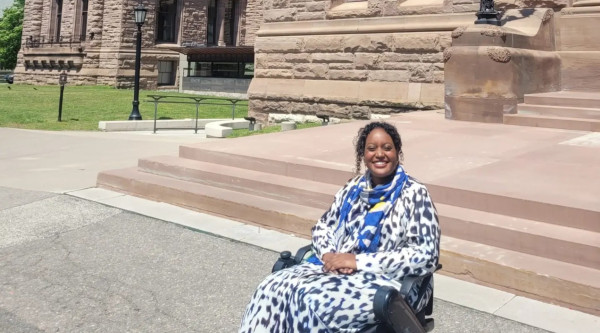More than 35,000 people have been killed in Gaza during Israel’s military campaign, and about 125 of the 252 people who were taken hostage after Hamas launched their surprise attack remain in captivity.
Recently, the International Court of Justice called on Israel to withdraw its troops from Rafah and halt its ground invasion. Meanwhile, the International Criminal Court issued arrest warrants for Israeli officials Prime Minister Benjamin Netanyahu and Defense Minister Yoav Gallant, as well as three senior Hamas leaders.
People have been voicing their opposition to the war since its early days, but protests on university campuses around the world have become more concentrated in the last month.
{https://x.com/PatMorrell_CBC/status/1794179735888724069}
The encampments seem to have staying power, drawing on collective strength in numbers. But the move to silence these voices has been strong and swift.
But according to Kagiso Molope, “We are not living in a time of being quiet."
Molope is an award-winning novelist and playwright who was born in South Africa during apartheid and moved to Canada at age 21. The Writer's Trust of Canada invited Molope to the prestigious Politics and the Pen event on May 7, 2024.
The event is billed as “a unique fundraiser that celebrates Canadian political and literary cultures and brings together national politicians, talented writers, prominent diplomats, and notable arts and business leaders.”
Molope was removed from the event following an impromptu speech she gave to attendees. She called on them to use their power and influence to improve the humanitarian situation in Gaza. She found it sad and ironic that she was punished for making a political statement at an event that rewards political writing.
{https://x.com/kagisokeo/status/1788208426675314939}
Walk me through what happened when you got on stage and made your speech.
I got on the stage just as everybody was being called in. I stood there and told the Politics and the Pen co-chair that I had something quick to say. I said my name, and I’m a writer living in Ottawa. I was not invited to come on the stage tonight, so being a bit cheeky and joking about it.
Then I said I couldn't sit down without pointing out these three things: I proceeded to point out the death toll in Gaza and how it has increased just since the day I was invited.
My second point was to talk about the rates of malnutrition in children under the age of two in Gaza, and I got heckled a lot. There were things like, “Fuck you, fascist,” “shut up,” and “fuck off.” It was really quite crude. And I kept saying, I request just one minute of your time. I also said, “I come in peace,” which is important.
Then my third point was to say that “we have a lot of power and how do we use it?" Then I stepped off the stage and went to my seat. As I was sitting down, security came and told me to take my stuff. “I said, am I being thrown out?” They said, “Please take everything that you have. You're being asked to leave, and you know why." The co-chair was there, as well, he was part of escorting me out and he was very angry and expressed his anger. They escorted me out and then shut the doors and stood in front of them so I couldn't go back in.
What went through your mind when you were being heckled and escorted out of the venue?
It was frightening. To be a woman surrounded by men being walked out. So, I was trying to keep my cool because I was scared. The other thing I kept thinking was that this is a political space to celebrate political writing. The Shaughnessy Cohen Prize for Political Writing is for us outspoken writers in politics, it was named after an MP who was an outspoken politician. So my thinking was, am I being thrown out because people disagree with what I said? What did I say wrong? Because I didn't imagine that just speaking in a political space was forbidden. I was scared and quite disheartened. I spent 75 minutes talking to a friend just outside the venue. One thing that I kept saying to my friend over and over was, that these were the people who were supposed to care. We are the writers who talk about world events, this space celebrates being outspoken about world events but what just happened... I couldn't even understand.
{https://x.com/LeftHandStu/status/1787999685325508731}
When you were reflecting on what happened, were you thinking about whether people weren’t necessarily upset with the message, but who the messenger was?
I've been invited to this event before; this was my fourth time. Each time, there have been no more than three or four Black writers, and when there are so few of you, you are very aware of being in the minority or that this isn't a very diverse space, which becomes uncomfortable. I wondered if white men had spoken, if they would’ve been thrown out. I thought, being an outspoken Black woman and how that's never welcomed. The other thing that I am always aware of is when you’re invited to these spaces, I think that all you are meant to feel is gratitude, and it’s not meant to be your space as well.
The Writer’s Trust position is that I was not invited on stage, and my response to that is that nobody ever invites you to protest. People protest because something needs to change and institutions don't invite people to change them, we have to take that part into our own hands. So I felt… that they wanted me to show up, be quiet, and sit. I think their insistence on saying that I wasn’t invited to speak is saying something without saying something. I think what they're saying is, I was meant to be seen and not heard. What they're actually saying is that I was meant to know my place. But we're not living in a time of being quiet.
I think that if I’d gotten up on stage and said, I just want to quickly take a moment to say how grateful I am to have been invited to this event, I want to commend the Writer’s Trust for raising all these funds, it's so meaningful to me as a writer of colour to be here, something like that, I don't think anyone would have thrown me out. I wasn’t thrown out because I spoke without being invited, I was thrown out because what I had said was being disruptive, and not just to the evening but to the system, to the organizers of this event. It's important to note that it wouldn't have been rowdy and disruptive if people hadn’t been screaming obscenities at me.
I just said those three points that aren’t even divisive when you think about it. Nobody said anything about Israel-Palestine, I didn't even take a position. I was talking about loss of life and malnutrition. There’s nothing in there that signalled danger. The other position that the Writer’s Trust took is that the security people escorted me out because they deemed something to be disruptive in the middle of a room populated by high-ranking officials, and then it was their impulse to kick that person out. So, if they're going to make it a matter of safety, why would the hecklers be allowed to stay?
Some people have said that you shouldn’t have used the event to speak up about the situation in Gaza. How do you respond to criticisms like that?
Then what is the place? I think people need to be clear about where protests are and aren't allowed. I think what’s happening is that people are making spaces unsafe for protest, instead of protests making spaces unsafe. What you’re doing when you throw me out of a place like that is you're saying that I am making the space unsafe for the people in the room. But the people in the room are meant to be the ones who are questioning, who are at the forefront of political analysis. Why would they feel unsafe by hearing political speech?
When people say this is not the place, they're saying that we want comfort in our spaces, we want to be comfortable in a university when you come in and tell us something that we don't like to hear. You're making us uncomfortable, you're making us feel unsafe in our own spaces.
You're acting as if free speech is making spaces unsafe, what you are actually doing is making spaces unsafe for scrutiny, for free speech; it’s the other way around. We're not in a time where we can afford comfort. We can't be writers, journalists, ambassadors, or politicians and say, “not now.” Well, it's urgent. People are dying every day. Children don't have food. When, if not now, are we meant to? Am I meant to gather a few of my friends and protest behind closed doors?
That's not free speech, and that's not freedom. If we're meant to lock ourselves away with like-minded people and only speak then, that's not how you change the world. This is exactly the place where we should talk about it; there's no better place.
{https://x.com/nowtoronto/status/1794163979289297001}
We’re seeing right now in Canada and the States encampments on university campuses and discussions about free speech and civil discourse. Do you see a connection between your speech, what those students are trying to do, and the moment we’re in?
I think we're in a moment of chaos and sometimes chaos calls for chaotic intervention. I think we just don't have time, I think there's an urgency to this and we can't ask people to speak politely or say it quietly. I think there's a sense of desperation. I know that I feel desperate and that's part of the reason I spoke. I think all the students protesting are feeling desperate. I think the main thing really is that this is something that should be celebrated. We are deeply analytical people and it should be celebrated that in a moment where we're witnessing one of the most devastating humanitarian crises of our time, how do we ask people to keep it down?
Why do you feel desperate?
One is that I am a South African, and for us, the way we speak of this violation of Palestinian people's rights and lives is that this is a matter of conscience. I think all the world is watching and is appalled and devastated by the events and the details. But South Africa has been watching Palestine for decades and we’ve seen similarities between our apartheid and Israeli apartheid. For me personally, it's exactly what I was raised to watch out for. Just like someone whose parents survived the Holocaust was raised to watch out for that so that it never happens again. Because I come from people who warned me against these atrocities around the world, so I'm observing and I'm watching that this doesn't happen again to other people.
But also as a mother, I have children asking what’s happening. My daughter was bullied for going to school and saying, it's terrible what's happening in Palestine. She's 12 and she was bullied for that. That's the extent to which silencing is happening.
So, that's why I was feeling desperate. You're invited alone, you're not invited to bring a plus one with the idea of networking. And this was exactly the place where we could put our heads together, and find out what other people are doing both in and outside of the room that can bring this crisis to an end.
Earlier this year I spoke to a human rights lawyer who was also born in apartheid South Africa. He compared the moment we’re in now to the Sharpeville Massacre in 1960 and the shift in global consciousness that followed. What do you make of that comparison when applied to Israel-Palestine?
I think that sometimes those are the sorts of things that awaken people. Unfortunately, death in large numbers awakens the world to the severity of any situation when the people that are in that space, are already living with those atrocities, violations and violence. I wish that it didn't take that.
What I've been thinking about a lot is that South Africans were protesting against apartheid for years before the world woke up to it and Palestinians have been telling the world that they have been brutalized by Israel for a long time and the world is only waking up now. When somebody like me stands up and speaks in front of a group and is being silenced, we need to recognize that these aren't isolated, insignificant incidents. We need to recognize that when somebody speaks, that's when we need to start listening. We shouldn't wait for things to get worse to start listening.
The papers are not covering what happened to me because it's seen as a small, isolated thing that has nothing to do with anything. We should watch out for small incidents of free speech suppression. When the lone thinkers, artists, and writers start speaking, we should start listening because we know how much worse things can get. When we kick them out of rooms where they're trying to tell us what's happening. When we deny them attention, when we deny them protests, it leads to much worse things. I don't think people quite see it that way.
Let's talk about how what happened is actually directly related to how Canada is having or isn't having a conversation about Palestine, how it's directly related to what we're seeing on Canadian campuses. It’s directly related to a violation of a fundamental human right to free expression. And nobody has wanted to talk to me from that point of view.
I'm just seen as a writer who went rogue and it's not all it is; I'm part of a movement. I did this completely alone, without consulting anybody, which when you think about it is a bit nuts but part of the reason I didn't want to consult even friends about it is there's so much fear of speaking out that I think probably a lot of people would have cautioned me against it, it's probably best for your career, for your future, not to say anything.
As someone who was born in Apartheid South Africa, what do you make of your native South Africa’s push to have the ICJ intervene on behalf of the Palestinians?
I think the decision to speak has a lot to do with my South Africann-ess. Free expression in South Africa is celebrated. I come from a young democracy that hasn't had a chance to forget its own past, so we're still in that place of saying “Never again.”
I'm not afraid of speaking up, I'm afraid of not speaking up.
I'm afraid of what that means for freedom of expression. I'm afraid of what that means for the people I'm speaking out for. Not having grown up in Canada works to my advantage because I come from revolution, I come from a people fighting for their own rights every single day.
My father was tortured in jail, was regularly missing, and narrowly escaped death. You don't live through that, then be afraid of speaking.
So, I was afraid of leaving that event not having spoken because that's what's drilled into you.
It's the culture I come from; you can't be quiet.
Secret solidarity is not solidarity.

 By
By 







